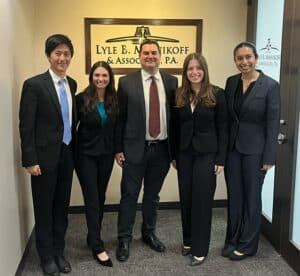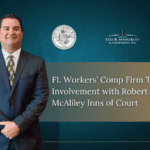BAN ON RETAINER AGREEMENTS HELD UNCONSTITUTIONAL
CURRENT WORKERS’ COMPENSATION ATTORNEY’S FEE LAW:
Before June 5, 2013, Section 440.105(3)(C) stated that an attorney may be guilty of a first-degree misdemeanor if the attorney “receives payment relating to a workers’ compensation case, unless the payment is approved by a Judge of Compensation Claims.” Likewise, Section 440.34, the general attorney fee statute, clearly states that the Judge shall not approve a fee outside of what is provided by Florida Workers’ Compensation Law. Retainer agreements are arrangements in which a client contracts for an attorney’s services by paying a fee to obtain counsel for a specific case/matter. Generally, retainer agreements are outlawed by 440.105(3)(c) and 440.34. Hourly fees are permitted based on the time counsel spends securing medical or indemnity benefits for his/her client. A typical retain agreement contemplating an hourly or flat fee payment is prohibited by Florida Statutes Section 440.
FACTS OF THE CASE:
In Jacobson, the Claimant did not prevail in his attempt to secure permanent total disability benefits and continued compensability of Claimant’s low back condition. The Employer/Carrier filed a Motion to tax costs against the Claimant. The Claimant’s initial counsel withdrew from the case as he stated that it would not be economically feasible for him to continue representing the Claimant in this case. Claimant retained another attorney, and that attorney attempted to secure an hourly retainer agreement at the rate of $175 per hour. This retainer agreement contemplated services and advice “solely on the issues that arise as a result of the Verified Motion to Tax Costs against the Claimant.” At the trial court level, the Judge of Compensation Claims denied the retainer agreement, ruling that Chapter 440 banned approving an hourly fee “under such circumstances.”
The Claimant was forced to represent himself at the Hearing. The JCC awarded the Employer/Carrier over $17,000.00 in costs to be paid by the Claimant. The Claimant appealed the Judge’s decision and argued that the Judge’s ruling violated his First Amendment rights to free speech, freedom of association, and rights to petition the government for redress. The Claimant further argued that the violation of his First Amendment Rights infringes on Claimant’s right to contract for legal counsel.
THE DISTRICT COURT OF APPEALS’ DECISION
The 1st District Court of Appeals concluded that there was a violation of Claimant’s 1st Amendment rights. The Court opined that the Judge of Compensation Claims infringed on Claimant’s rights to contract for legal counsel. The Court reiterated that First Amendment rights are fundamental and that strict scrutiny review was necessary. Strict Scrutiny is the most in depth and heightened review provided by Constitutional law. The District Court Judges opined that the right to hire an attorney includes the right to speak/write through counsel before the court, the right to assembly and the right to petition the court in one’s own defense to seek redress. The District Court stated that the governmental interests (lowering workers’ compensation costs, premiums and protecting workers’ compensation benefits from depletion) prohibiting certain attorney’s fees arrangements are not a permissible use of the State’s police power. Moreover, the Court held that these governmental interests did not survive strict scrutiny, and as such, would not be necessary to restrict Claimant’s “First Amendment right to contract for legal services to defend against an Employer/Carrier’s Motion to Tax Costs. The Court ultimately ruled that the prohibition on Claimant-paid attorney’s fees in Sections 440.105(3)(c) and 440.34 were unconstitutional and unenforceable. The Court, however, was not willing to universally apply this prohibition. The District Court held that these sections are unconstitutional as they apply to cases where the “fee is for legal services performed in defense against an Employer/Carrier’s Motion to Tax Costs.” The Court reasoned that the goal of the Legislature in preserving benefits to a claimant by limiting attorney’s fees is not implicated in a situation where costs are being assessed against a claimant.
FUTURE FOR FEES
Although the Jacobson case has been restricted to retain agreements contemplated in the defense against an Employer/Carrier’s Motion to Tax Costs, a positive wave of decisions have been decided by the First District Court of Appeals. Now that attorney’s fees arrangements under the previous law are being held unconstitutional in cases involving Motions to Tax for Costs, the hope is that other attorney’s fees cases are brought up on appeal on Constitutional Grounds. The Westphal v. St. Petersburg case was another recent landmark decision which provided extended temporary benefits for an injured worker that is unable to work and is incapable of finding employment. This decision coupled with the Westpahl decision should lead to continued review of the law as it stands in 2013. Medical and compensation benefits such as permanent total disability benefits, psychiatric care and physician selection should usher in a new wave of challenges to Florida’s Worker’s Compensation law.
























